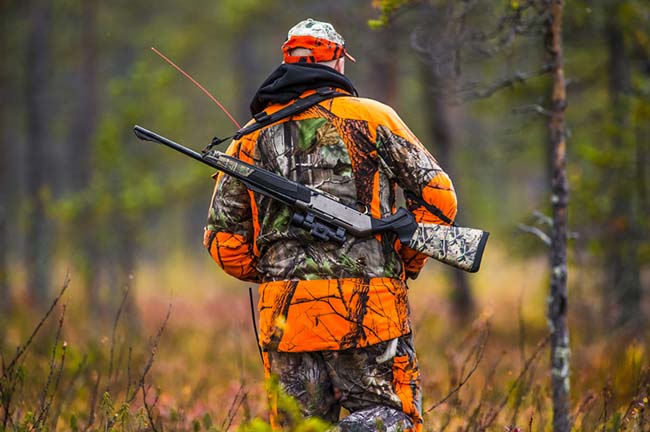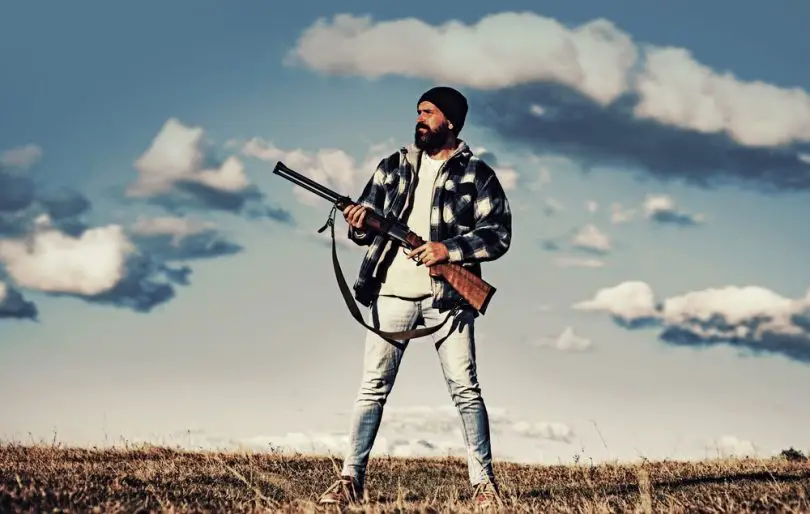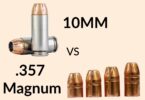A telling revelation is that there are less than 3000, to be precise 2490, organizations in the US focusing on hunting, trapping, and fishing. What about professional hunting? The numbers are plunging. Hunting has deep roots in American culture.
But how to become a professional hunter here in America? This guide will show you exactly how!
The money raised from licensing fees helps the US Government fund its different conservation endeavors, such as its Fish and Wildlife programs. You can take your hunting passion to a whole another level by becoming a professional.
This guide is designed to set you off on the journey to becoming a professional hunter.
What is Professional Hunting?
Professional hunting refers to the practice of hunting for profit solo or as a business enterprise. In other words, professional hunters are individuals who are trained and licensed to hunt game animals for sport or for meat. They also often offer their services to clients who are willing to pay for the opportunity to hunt under their guidance.
Professional hunting usually involves hunting on private or public lands in different types of environments, such as forests, grasslands, and wetlands. Some commercial hunters specialize in specific game animal types like big game or waterfowl while others may offer a broader range of hunting opportunities.
In many countries, professional hunting is regulated by government agencies that require the hunters to obtain licenses and adhere to specific rules and regulations so they can operate legally. This usually includes limits on the types and numbers of animals that can be hunted, and restrictions on hunting methods and equipment.
What to Know before You Try to Become a Pro Hunter?
Since you’re here to know more about how to become a professional hunter, you need to know that it’s not so easy to make a business out of your hobby, especially when the competition is high.
Anyone who can read wind and sit still will hunt good, but you’ll have to be good at selling yourself if you want to make good money with a number of sponsors and a large follower base.
Keep in mind that you’ll have no retirement and no health insurance while most of your life will be spent on the road. For every 5000 “pro” hunters waiting to get sponsors, there are only about 20 that’re actually having it.
Also, things will get more difficult when you’ll realize you’ll be regularly taking down trophy animals on camera, and a bad season could mean the end of your career. But then again, you’ll never know what’s in there for you until you’ll give it your best!
So, if you’re still determined, you have to find a way to create real value and stand out from the crowd.
How to Make Money as a Professional Hunter?
As a professional hunter, there are several ways to make money.
1. Guided Hunting Trips
As a pro hunter, you can offer guided hunting trips to your clients that want to hunt big game such as elk, deer, or bear. You can charge a fee for your services and also charge for the hunting license, permits, and tags.
As a guide, you can expect to make between $50 to $300 per day based on the type of hunting and location.
2. Trophy Hunting
Some avid hunters are willing to pay a lot of money for the chance to hunt rare or exotic animals such as lions, elephants, or rhinos. If you have access to land where these animals can be hunted legally, you can charge a premium price for your services.
For rare or exotic animals such as big cats or elephants, the price can range from $5,000 to $50,000 or more. Professional hunters who specialize in these types of hunts may receive a percentage of the total cost, typically between 10% and 20%.
3. Hunting Education and Training
Many people want to learn how to hunt or improve their hunting skills. You can teach them basic hunting skills, such as tracking, scouting, and different hunting techniques.
As an instructor, you can make an average of $25 to $50 per hour, depending on your experience and location.
4. Wildlife Management
You can also helping landowners manage their wildlife populations and resources. This can include trapping and relocating animals, culling populations to prevent overpopulation, and helping to create habitats for wildlife.
Salaries for wildlife management positions can vary widely. Some positions pay an annual salary of $30,000 to $40,000 or more.
5. Outfitting
Outfitting means providing hunting equipment and supplies to clients. This can be everything from guns and ammo to camping gear and food. You can charge a fee for your services and also mark up the cost of the equipment and supplies.
As an outfitter, you can charge between $2,000 to $15,000 or more for a hunting trip and earn a percentage of the total cost, typically between 5% to 10%.
To be successful as a professional hunter, you should have a strong knowledge of the local hunting regulations, safety, and ethics. You should also have excellent hunting skills, a strong work ethic, and the ability to provide excellent customer service to your clients.
How to Become a Professional Hunter?

1. The Hunting Type
The first and most important decision you need to make is what type of hunting you want to partake in.
What kind of game animal do you wish to hunt? What’s the geography, seasonality, and your own personal interest?
Your preference of game; a big game such as elk or deer; a small game like rabbits; upland birds, waterfowl, or amphibious creatures?
What are the weapons you are familiar with? The revolvers, the rifles, shotguns, the crossbows, the compound bows, the longbows, or something else?
Marketing is an essential part of going pro. Determining your expertise, and conveying it to your customer base in a well-crafted language is essential. Most paid hunters involve endorsing a certain brand of equipment. They could be writers or videographers who document their hunting experiences to further the sport among budding enthusiasts.
Hosting TV hunting shows is yet another avenue. Another alternative is selling meat to farmers.
Professional hunters can also work alongside the U.S. Fish and Wildlife Service in their animal control efforts.
2. The Application Process
Annual screenings are conducted by most organizations looking to rope in pro-staffers. Whatever the position may be, it aims to fulfill a particular need.
Hunters are included. Your resume, specific hunting skills, and your game-tracking background, all figure. For instance, one organization we are aware of looks for hunter-videographers who can submit a video resume and has 4 years of experience.
Another organization is on the lookout for hunting pro-staffers who are well-spoken, well-written, and highly educated. The US Fish and Wildlife offers the general public a simple online application process for a number of openings. Check it out.
Keep your eyes peeled open for local openings. If you are starting off, we advise taking up a position even if it is less paying than you’d wish for.
Regardless of where you are applying, make sure to play upon your distinctive qualifications, great skill sets, accolades, and above all, passion for the outdoors.
3. Education, Certification, and Membership
Going professional is worth the effort. To maximize it, get a college degree though this is not compulsory. The subject could be wildlife management or animal science. This will certainly separate you from other candidates.
Hunter education courses offered by many states are a huge bonus in your landing a pretty good job as a hunter. These could be instructor-led or online self-study programs.
You become eligible for certain permits- training on local wildlife; regulations and codes for the areas you will be hunting in. The transition to going pro, calls for establishing credibility, and professional knowledge, and building up your contacts.
Membership in recognized hunting organizations such as IPHA, Buckmasters, and The Rocky Mountain Elk Foundation that’re well known in the hunting community is highly recommended.
4. Enhancing Your Skills
Come what may in this process of transition, letting your basic hunting skills rust is a bad omen. It is your bread and butter, so enhancing those skills and learning never ends.
It will remain an ongoing process. To be truly successful, you need to keep abreast of current developments and technology.
There is a constant flow of new equipment, and new legislation that you as a professional hunter cannot afford to skip.
Read up, scour the net; keep abreast.
5. Investing in the Right Equipment
In this age, you cannot afford to be a Daniel Boone with a musket. You, as a professional hunter, need to have the best equipment. This is not fashion advice, but a reminder that you need to pay attention to detail. Weaponry and apparel are simple.
Animal attractants are a different ballgame. If you want animals to play ball, then get them to you. You can use decoys or game calls, create your own hunting strategies, and even plant turnips. Ground blinds and tree stands work wonders.
The learning curve is not steep, but something you want to make a habit of.
How to Become an Expert Hunter?
Who is an expert hunter? There are some checkboxes that need ticking off before you claim to be one.
You are a hunting guide. To be called an expert in this area, you need to be darn good in your choice of trade.
Play to your strong points. Or, develop new strengths. Either way, you want to deliver the best to your customers.
Soft skills cannot be given a skip. Get working on these.
1. Great communication skills
You will be working with clients from many walks of life in your hunting expeditions. It is important that your communication style addresses individual needs.
A hunting excursion requires a clear understanding among the parties involved. Your camp will be happy and safe.
2. Organization skills
A hunting guide needs to be an efficient organizer. There are many aspects involved in an excursion that would need your supervision. Setting up shelter, getting meals prepared, navigating rough terrain, and harvesting downed game. You are the peg on which every facet of the hunt hinges.
3. Teaching Skills
Your clients will be of both categories; those with experience and rookies. To ensure safety and the success of the outing, being a good teacher is important. You will be called on to correct a client’s shooting style, show how to clean a kill, stalk prey, and so on.
Wisdom, patience, and skill all play a role in being a successful hunting guide.
4. Good physical fitness
It is physically demanding to be a hunting guide. You may be called upon to spend up to 16 hours traversing rough terrain and braving adverse conditions. Strength and stamina are called for in such trying conditions.
Conclusion
We have laid the groundwork to steer you on the path of becoming a professional hunter. You can now make a smooth transition to a rewarding career and the best part is that it involves something you are passionate about.
A career in hunting is still a rarity which makes your chances of success even better. Happy hunting!









Leave a Comment